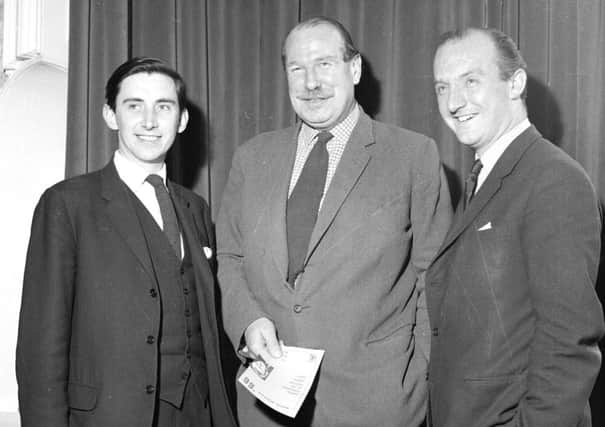Obituary: George Yull Mackie, Baron Mackie of Benshie


Scotland abounds in men of distinction whose lives and careers are in some way contradictory. Lord Mackie, George to his friends and colleagues, was of their number, a man who, to all appearances, should have been a quintessential Tory, but, in practice, became a Liberal, a businessman with a social conscience, whose aim was as much to create employment where he was known and had influence, as to derive personal benefit from his work and enterprise. He took many risks, and not all were successful, but the majority of them were.
His father was a successful gentleman farmer in Aberdeenshire, who served on the county council and became Lord-Lieutenant, being also active in industries and public bodies throughout Scotland. His son continued the tradition, becoming a laird and an entrepreneur, the founder of several Highland industries, of which Caithness Glass and Caithness Pottery were perhaps the best-known.
Advertisement
Hide AdAdvertisement
Hide AdHe also founded Caithness Cheese, which had a considerable vogue in the 1960s when Scottish cheeses were being successfully marketed, but it was not financially viable, due, he said, to the impossibly high standard set by his Danish cheesemaker, who was never able to produce the quantity of his branded product necessary to make the enterprise profitable.
But George Mackie’s elevation to the peerage came through politics. He was one of the small group of stubborn and committed diehards, only a few of them like him landed gentlemen, who kept the Liberal Party in Scotland going when it was, everywhere after the war, in continual decline. Together with Jo Grimond, he can take much of the credit for maintaining morale and laying the seeds for what eventually became a slow revival. He contested South Angus in 1959, and was elected MP for Caithness and Sutherland in 1964, remaining in the House of Commons for the period of the first Wilson government. During that time he was a popular and bonhomous member of the House; the Liberals were only a handful, but their quality made them noticed, and their influence, especially in social and humanitarian reforms, often unpopular in many parts of the country, was out of all proportion to their numbers.
During his second year as MP he became chairman of the Scottish Liberal Party, whose leader was then Grimond, a close friend, whom he resembled in background, class and manner: both members of a rural aristocracy whose Liberalism was much resented and criticised by the great majority of other landowners, overwhelmingly Tory.
After losing the 1966 election, he gave more of his attention to his agricultural and business interests, but remained chairman of the party and active in its affairs at a time when it was badly squeezed by Labour and the Conservatives, running almost equal in general elections, and by the rising popularity of the Scottish Nationalists. He contested the European parliamentary election in 1979 for the North-east of Scotland, but lost to a Kinross-shire farmer who, due to a family connection, had the support of much of the local press.
Having been chairman since 1965, Mackie became president of the party in 1983, leaving the more onerous chairmanship to Menzies Campbell. He was made a life peer in 1974 and became active in the Lords on many committees, some to do with Europe, possible new electoral systems, and ethical agricultural and commercial issues, all the while supervising his farming interest in Kirriemuir and commercial enterprises in the north.
Lord Mackie gave his name and support to the arts and Scottish life generally, being a director of Scottish Ballet in the late 1980s and, before that, rector of Dundee University from 1980 to 1987. He was a good and witty speaker in jovial and attractive style, but always with an air of authority that it was unwise to challenge.
Much of the credit for keeping the Scottish party alive during its most trying era should be his; he made it possible for a new generation, attracted largely by the charisma of Jo Grimond, talented and ambitious new politicians such as Russell Johnstone and David Steel, to enter the party, find their constituencies and make successful careers. Mackie was in many ways a 19th century Whig, but with the instincts and humanity of a modern Liberal.
He was educated in Aberdeen, joined the RAF at the outbreak of war, served in Bomber Command, receiving the DSO and DFC, and was then appointed to the Air Staff under Sir Arthur Harris. After 1945, he returned to farming, like his father, until politics and the need to build rural industries also attracted him.
Advertisement
Hide AdAdvertisement
Hide AdHe suffered a stroke on Saturday morning at home in Benshie Cottage, Oathlaw, near Kirriemuir, Angus, and was taken to Ninewells Hospital, Dundee, where he died yesterday morning at 9:05am.
He was married, first in 1944 to Lindsay Sharp, with whom he had three daughters, and, after her death, to Jacqueline Lane, a widow, in 1988.
He is survived by Jacqueline, his three daughters, Lindsay, Diana and Jeannie, seven grand-daughters and four great grandchildren. His life was productive and happy.